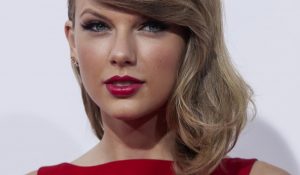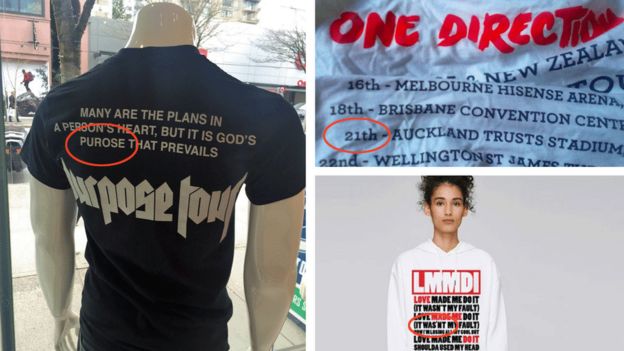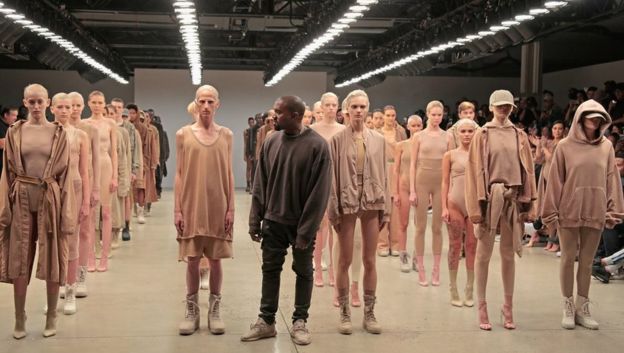

TAKE a look at the headline at the top of this article.

Not every T-shirt appears to have been printed with the typo, prompting some fans to ask if it was deliberate
Did you spot the misplaced apostrophe? If you didn’t, don’t worry, you’re in good company: Taylor Swift has been named and shamed on social media for mis-punctuating one of her T-shirts.
Quoting the lyrics to her new song, ME!, the shirt declares: “Your’e the only one of you.”
Swift’s mistake is all the more delicious because, elsewhere on the single, she sings: “Hey kids, spelling is fun!” (Fun fact: Swift once won her elementary school’s spelling bee contest).
But she’s not the first pop star to slip up on the icy path of good grammar.
Last year, Cheryl made a similar punctuation error on a hoodie featuring lyrics from her single Love Made Me Do It (“it was’nt my fault”), while One Direction sold T-shirts for their 2012 Australian tour listing a concert on “21th June”.
Justin Bieber also recalled a garment for his 2016 Purpose tour after fans pointed out he’d invented the new word “purose”.

Mistakes are “not common but not unprecedented,” says Henry Oliver, editor of New Zealand’s Metro magazine and co-author of The Art Of The Band T-Shirt.
“Getting the names of cities wrong is the most common mistake – but once you’ve left for tour, and you’ve got boxes of T-shirts, the error seems to stick.”
There’s a reluctance to scrap mis-printed merchandise because of the cost involved. A run of 1,000 T-shirts costs about £2,500; and major artists will print many more for a world tour.
Added to which, “there’s been a general shift towards merchandise as a revenue generator since the decline of record sales over the last 15, 20 years,” says Oliver.
According to the Licensing International, the global music merchandise market was worth $3.1 billion (£2.4 billion) in 2016.
To put that in perspective, revenue from live music concerts worldwide last year was $5.65 billion (£4.44 billion); while the global market for recorded music was worth $19.1 billion (£15.04 billion), according to the IFPI.
So merchandise is a vital source of income – and artists are finding new ways to exploit its potential.
“Over the last five years, there’s been a new emphasis band merchandise as street wear and fashion,” says Oliver.
“So, for example, Harry Styles came to play recently in Auckland, and there was the opportunity to go and buy merchandise the day before the show.
“That seems to be an increasingly regular occurrence, whereby artists will come and have pop-up shops that will almost be selling a clothing line. It’s more akin to fashion than traditional concert merchandise.”

Kanye West, who takes fashion as seriously as music, helped pioneer the trend, launching his Yeezy collections with lavish shows at New York Fashion Week.
Notably, his designs sell at much higher prices than the average £20 tour T-shirt, a trend that’s been followed by Justin Bieber and David Bowie – whose Paul Smith-designed Blackstar shirts went for £65 each.
Taylor Swift charges more fan-friendly prices for her merchandise – but that wandering apostrophe could bump up the cost of her tour Ts for collectors.
Misprints and mistakes are particularly interesting to “hyper-completists”, says Brent Greissle, the discography specialist at music trading website Discogs.com.
People will pay high prices for a rare pressing The Beatles’ 1970 compilation album Hey Jude, where song titles are erroneously listed as “Paper Back Writer” and “Revolutions” (instead of Paperback Writer and Revolution, respectively).
Collectors will also pay upwards of £500 for a vinyl pressing of Rubber Soulwhere the label lists the geographically-challenged Lennon-McCartney composition “Norweigian Wood”.
“Especially with those examples, it’s something of a big price difference for incredibly minor things like slight spelling errors,” says Greissle – whose favourite mis-prints are on bootleg records like “Sexperience The Hendrix” and the timeless “Best Of Eric Crapton”.
He says fans of artists like the Beatles, David Bowie, Led Zeppelin and U2 are more likely to seek out these rarities – but “for the most part, the difference between an error copy and a regular copy may be negligible at best.
“Rest assured, the number of people who would care about a typo on an Andy Williams or Mantovani pop record are far less than the supply.” – news.sky.com